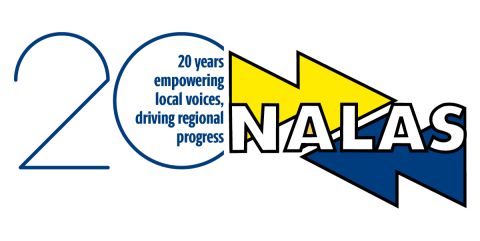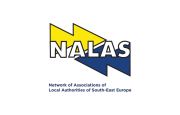
The EU strongly backs local green & digital transformation, but many SEE local governments aren't aware of the benefits. Funding from the Digital Europe Programme is available, but awareness is lacking, with few national helpdesks established. Partnering with EU cities is underutilised. NALAS & KDZ worked on digitisation, forming a group to exchange experiences and tap into EU initiatives. This collaboration fosters understanding, bridging gaps and enhancing participation in EU initiatives.
- Local and regional | EU/ European | Digital and ICT
- Code: Side241013
- Trg cara Uroša 1, Sombor, Serbia
Speakers


Zeljana Burazin

Dejana Radovic
Moderator

Alexandra Schantl
Practical information
- When
-
Wed 16/10/2024, 13:00 - 17:30 CET
- Where
- Trg cara Uroša 1, Sombor, Serbia
- Type of partnership
- EURegionsWeek close to you
- Format
- Side
- Theme
-
Smart and sustainable growth for regions
- Language
- English

Partners
Documents
Reporting
Session summary
I. Empowering Local Governments in the Digital Transformation Process in the Western Balkans
The event held in Sombor, Serbia, focused on empowering local governments in the Western Balkans and Moldova to advance their digital transformation. A key discussion centered on the results of the BACID project, which highlighted significant achievements, challenges, and next steps. The NALAS-led working group on digitalization presented findings from a comprehensive report on digitalization within the region, identifying key challenges such as funding gaps for green and digital transformation, awareness of available funding opportunities, and the skills and competencies of public administration at the local level. Key discussions, led by Jana Belcheva Andreevska, underscored the need for digital skills training for civil servants, alongside the importance of establishing a robust digital competence framework.
The study presented critical areas such as the need for improved infrastructure, enhanced skills, and effective e-government services. It emphasized the importance of political will, alignment between local and EU strategies, and ensuring inclusive access to digital services. Key recommendations focused on enhancing open data practices, promoting cybersecurity, addressing the rural-urban digital divide, and fostering collaboration across stakeholders to build a sustainable digital ecosystem.
While the potential for digitalization in the region is significant, its realization requires strategic alignment and organizational commitment. Enhancing absorption capacities for EU funding and EU programs is needed.
Pilots from the region were also presented, with notable examples including the smart parking management system in Sombor, Serbia, and the remote health monitoring systems in Delchevo, Macedonia. These pilots, supported by the Austrian Development Agency and the KDZ Center for Public Administration Research, illustrated practical applications of digital transformation at the local level.
Discussions further emphasized the necessity for stronger alignment of local, national, and EU strategies, the need to bridge funding gaps, and the importance of digital skills training, knowledge exchange, and the sharing of good practices. The meeting also stressed that political will is essential to driving the digital transformation needed to improve public service delivery and foster economic prosperity, supporting smart and sustainable growth for communities, cities, and municipalities. Thomas Prorok, Director of KDZ, highlighted the crucial role of digitalization in governance and welfare for the region. NALAS strongly supports local digital transformation in the Western Balkans and Moldova under the BACID project, which actively promotes local government digitalization through webinars, study visits, and regional events like the Western Balkan Digital Summit organized by RCC.
II. Perspectives from Local Government Associations in the Western Balkans and Moldova
Chisinau City Presentation:
The City of Chisinau has made significant strides in enhancing transparency, citizen engagement, and urban management through a variety of e-services. These include the GIS Locals platform for spatial data management, the Transparency platform providing real-time access to municipal budgets and procurement processes, and the SMART platform, which integrates essential city services such as permits, complaints, and interactive maps. These initiatives aim to provide seamless access to information, improve governance, and foster active citizen participation. Furthermore, Chisinau has focused on innovation in public transport and education, with projects like the “Move it like Lublin” initiative, which adopts EU practices for urban mobility, and its online education platforms, E-School and E-Kindergarten, making educational services more accessible.
Podgorica City Presentation:
Podgorica is progressing with its digital transformation through initiatives like ePodgorica 2.0, which simplifies citizen interaction with city administration by offering services such as online document submission and voice interaction. The platform encourages the use of digital tools and promotes cooperation between local and national authorities, improving citizen engagement. Additionally, the city is focusing on smart city solutions, including air quality monitoring, smart traffic signals, and real-time transport tracking. Despite challenges like political instability and budgetary delays, Podgorica remains committed to its vision of becoming a fully smart city, with a focus on sustainability and improving the quality of life for its residents.
Marmara Municipalities Union (MMU) Presentation:
The Marmara Municipalities Union (MMU), based in Istanbul, is Turkey’s largest regional local government association, with over 180 members. MMU is NALAS member and active participant in the Digitalization working group. MMU promotes cooperation and knowledge-sharing among municipalities in various sectors, including migration, environmental management, urban technologies, and local development. The Union organizes events like the Marmara Urban Forum (MARUF) to foster global good practices in urban challenges. MMU’s initiatives also focus on smart cities and sustainable development, such as the Digital Twin Project in Istanbul, which aims to enhance disaster management and urban planning. MMU is dedicated to building capacity through training programs and sharing best practices, playing a crucial role in advancing urbanization efforts in Turkey and improving the quality of life and sustainability of its cities.
III. Promoting EU Initiatives to Support Local Green and Digital Transformation in South-East Europe
LORDIMAS Tool Presentation by the Committee of Regions:
The LORDIMAS tool is an interactive digital maturity assessment platform that helps local and regional governments evaluate their progress in digital transformation. It covers various domains, such as governance, service design, data management, interoperability, technology, and service delivery. LORDIMAS provides real-time data and allows municipalities to compare their progress with other European cities, while also acting as a repository for best practices. It aims to facilitate the exchange of knowledge and offer policy recommendations to guide digital transformation at the EU level. The tool’s development involved multiple stakeholders and was rolled out in phases, including testing and feedback. LORDIMAS is particularly important for the Western Balkans and Eastern Partnership countries, as it will support the alignment of their digital transformation efforts with EU standards and foster regional collaboration. The tool is expected to grow, engaging more cities and regions, and refining its capabilities to meet the evolving needs of local governance across Europe.
EU4Digital Program Presentation:
EU4Digital is a program funded by the European Union to enhance digital connectivity and accelerate the integration of the Western Balkans into the EU Digital Single Market. The program’s objectives include improving digital infrastructure, promoting interoperability and e-Governance, and supporting the digitalization of businesses across the region. One of the key initiatives, WiFi4WB, aims to provide 300 Wi-Fi networks across municipalities in the Western Balkans, addressing digital gaps and fostering the region’s inclusion in the EU’s digital ecosystem. Additionally, the program enhances trust services, such as e-signatures, and aims to develop a Balkans Digital Wallet to facilitate cross-border data exchange and improve the accessibility of public services. EU4Digital also provides support to MSMEs (micro, small, and medium-sized enterprises) to help them adopt digital solutions and engage in the EU Digital Europe Programme. Through fostering regional collaboration and improving digital skills, EU4Digital is building a foundation for the digital transformation of the Western Balkans, aligning the region with EU standards and improving the quality of life for its citizens.
COVALEX EU Project Presentation:
The COVALEX project focuses on strengthening cooperation in disaster risk management, especially in hydrometeorological hazards, by enhancing data interoperability between municipalities, civil protection authorities, and scientific institutions. The project utilizes IT tools, such as the NALAS IT Toolbox, to improve data sharing and decision-making across local and regional levels. It also emphasizes the importance of data interoperability in disaster risk management, ensuring the integration of diverse data sources and systems. By creating a web-based, open-source platform, COVALEX helps municipalities collect, organize, and analyze disaster-related data, providing comprehensive risk assessments and supporting real-time crisis communication. This initiative not only supports EU municipalities but also aims to improve disaster management in non-EU regions, promoting cross-border cooperation and ensuring that all stakeholders benefit from shared data and coordinated disaster response efforts.





